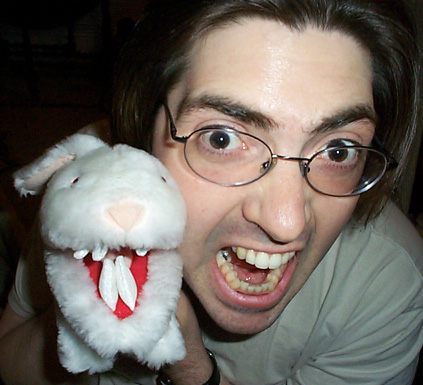My company sent me back to college to take a statistics course. This is my first step into a larger world – a world of exploration through analysis, a world of insight through mathematics, a world of weaseling out of things through fudging numbers.
Because statistics, much like golf, is nothing more than a secret handshake used between movers and shakers in the business world. In and of themselves, statistics and golf are completely meaningless and without any intrinsic value whatsoever, but using meaningless jargon as a way of communicating with someone else (i.e. “I concur that we must strive to maintain the integrity of the data sample.” Or, better yet, “On the third hole, I think it would be better to use a five-iron.”), you instantly identify yourself as a fellow weasel.
By saying one of the meaningless phrases, you are telling the other weasel, “I, too, perform this completely ridiculous and pointless activity, but I will sacrifice my personal sense of decency and good taste by not bringing attention to this non-speech coming out of me. I willingly do this so I can be a part of your tribe of weasels.”
I’ve tried this tactic to great success. Now I spend hours a day describing my backswing to others or pontificating on the struggles of obtaining a stratified sample. The weasels who run the world respect and admire me for this, and have responded in weasel-speak, that I am indeed one of them.
Which is pretty exciting. In one way, I feel like one of those Indian or Aboriginal youths, being taken to a rite of passage or a vision quest. After this sacred ceremony, I will be given a new name – Speaking Weasel – and I will be able to move deftly through the Circles of the All Powerful Overlord Weasels (CAPOW). Soon I will be hobnobbing with lawyers and politicians and people who commonly use the words “commodity market” to describe the non-weasel’s wardrobe.
My first step towards weaselhood happened the first night of statistics class. The topic – outliers. Outliers are “values that are extremely higher or lower than all other values” and outliers in your data set tend to corrupt your data. Say, for example, you are looking at new car prices. The prices of the cars are $18,000, $16,000, $20,000, $23,000, and a luxury car priced at $250,000. This luxury car is an outlier. The average price of the group of cars ($65,400) doesn’t realistically reflect the data set. So the $250,000 value corrupts the integrity of the sample set. And do you know what we, as neophyte statisticians, are supposed to do with this outlier?
WE IGNORE IT.
I am a big fan of applying knowledge to the real world, and so I couldn’t wait to use this new tactic in my life. On the drive home from class, I called my wife and picked a fight with her.
“Where do you want to eat Friday night?”
“I thought we already decided on Café Frou Frou.”
“But we always eat at Café Frou Frou, and I don’t like eating there. The portions are too small. Its overpriced, and the whole place looks like someone exploded a box of doilies in it.”
“We do not always eat at Café Frou Frou. Remember two weeks ago when I let you take us to Big Bubba Beltbuster’s BBQ?”
“HA! That trip to Triple B’s BBQ is an outlier! It doesn’t count!”
I won the argument, not because of my brilliant and weasel-like use of statistical principles, but instead because my wife thought my argument was “cute.” Which is fine. One of the first principles of weaselness is “It doesn’t matter how you get your way, as long as you get your way.”
I hope my company appreciates this education I’m getting.
Thursday, September 08, 2005
Subscribe to:
Post Comments (Atom)









No comments:
Post a Comment